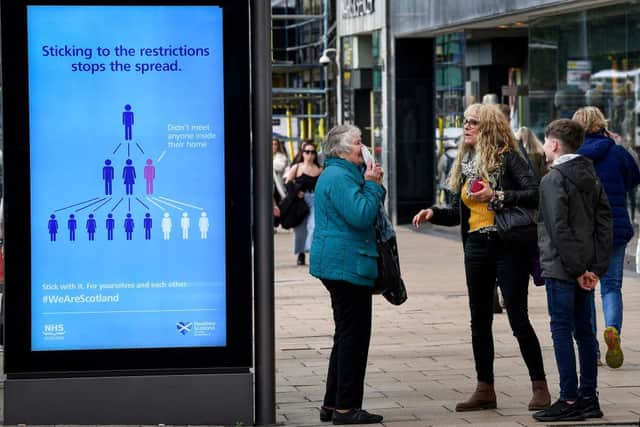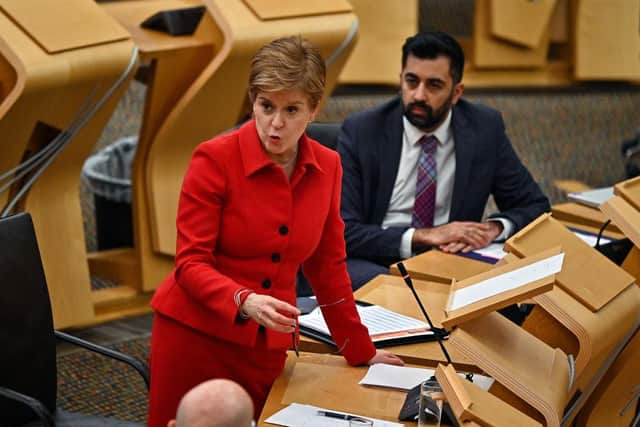Covid: Scotland needs circuit breaker lockdown over Christmas and Hogmanay, says senior NHS figure
There is “no time to lose”, said Jillian Evans, head of health intelligence at NHS Grampian, as while cases are rising exponentially it will take a “very short time” for the NHS to move from coping to being overwhelmed.
But Nicola Sturgeon, who is set to update MSPs today about possible restrictions, said these would not be increased before Christmas.
Advertisement
Hide AdAdvertisement
Hide AdIn a statement made last night, the First Minister said: “The Cabinet will discuss tomorrow and I will set out in Parliament if there are any additional or wider steps necessary, but I want to be clear to individuals that the advice I gave out last week is the advice that will take us through Christmas.”


The decision comes after Scotland recorded 6,734 new cases of Covid-19 in the 24 hours to yesterday – the highest daily total since September.
Ms Evans warned this was likely to be an understatement, as Public Health Scotland had noted a delay in reports of test results due to high demand.
The country is “nowhere near” the peak of the Omicron wave, which may occur in late January or early February, national clinical director Jason Leitch has said.
Modelling from the Scientific Advisory Group for Emergencies (SAGE) from last week suggests Scotland could see up to 600 deaths a day if no further restrictions were brought in, Prof Leitch told the BBC.


The NHS is also reportedly seeing increased staffing shortages because of the Omicron variant, as staff members fall ill or are required to care for others.
Scotland should move from attempting only to slow the spread of Omicron through the booster campaign, to preventing it through lockdown measures, Ms Evans said.
A circuit breaker lockdown would “buy time” for the booster campaign to be further rolled out and for immunity to take effect, she said.
Advertisement
Hide AdAdvertisement
Hide AdWhile this would be regrettable over Christmas, Ms Evans said there was “no time to lose”.
“A week to ten days, when you start to see the effect of hospitalisations in a hospital, makes the difference between coping and being overwhelmed,” she said.
“This is a really important time for us, so any actions we do will make a difference.”
The NHS is already expecting increased pressure from late this month into early January, Ms Evans said, as the current spike in Covid cases translates into hospital admissions.
Even if the Omicron variant results in a lower rate of hospitalisation, higher numbers of cases will lead to increased admissions.
Decision-makers should consider the “tougher end” of a return to the protection levels system used over the summer, Ms Evans said, including the cancellation of large events and closure of hospitality.
It is “hard to reconcile” the continued operation of these settings while people have been told to stay at home as much as possible and limit social contact, she said.
“There's something about making things official … very much the advice is ‘we're trusting you to do these things’, but it doesn't have that idea of ‘we're all in it together, following the same rules’ and I think that does make a difference,” she said.
Advertisement
Hide AdAdvertisement
Hide AdMs Evans added: “If you think back to the levels system … this tiered approach of very tough restrictions to ones which were less so as we moved through time, I think we are looking at the tougher end of that, even if we are thinking about doing it for a short time, a circuit breaker.”
Ms Sturgeon urged people to continue following the advice given by the Scottish Government last week, to limit social mixing to three households.
“My clear message to individuals is to reiterate the message I gave last week and that is, in the run-up to Christmas, please reduce your contacts, stay at home as much as is feasible right now,” she said on Monday.
“For Christmas Day and Boxing Day, we’re not asking people to cancel plans, but think about keeping them as small as your family circumstances allow and make sure everyone is testing before going, and following rules around hygiene and ventilation.
“Then after Christmas, for a period, limit your contacts again, so we can suppress infection as much as we possibly can, as we speed up the vaccination program.”
Professor Leitch warned the health service may “really struggle” if cases rise further.
"We are very hopeful that Omicron might not be as severe, so you might not get as many hospitalisations per 100 people," he told the BBC.
"But the fact you're going to get double, treble the number of cases means it's not long before our hospitals really struggle – and our hospitals are already finding it very challenging because of winter, postponed care, other diseases and some Covid."
Advertisement
Hide AdAdvertisement
Hide AdIt is not inevitable that hospitals will be overwhelmed, Prof Leitch said, but he warned of "difficult choices" around patient care as they become "very, very busy".
NHS Grampian has a “strong grip” on planning for higher demand in the new year, but Ms Evans said she is “fearful” about the effect on staff, with shortages already widespread and staff already exhausted.
The health board has already seen an increase in reported sickness absence in some wards, which risks “significant disruption” when concentrated on certain areas.
Judith Park, director of acute services in NHS Lanarkshire, said the health board was facing continued staffing challenges. Staff have been deployed from other areas to fill gaps, and some elective procedures have been cancelled due to staff absence, she said.
"The Omicron variant is having a negative impact on many of our health services and this pressure is likely to increase in the coming weeks,” she said.
She added: "We are asking staff and the public to pay particular attention to staying Covid-19 safe during the Christmas and New Year festive season by following national guidance.”
The Royal College of Nursing (RCN) said it has had reports of increasing Covid-related absences across health boards.
"While there is an isolation exemption in place for health and social care staff, the caring responsibilities that many nursing staff have can make this unworkable,” said Colin Poolman, RCN Scotland interim director.
Advertisement
Hide AdAdvertisement
Hide Ad“Nursing teams are already short staffed, with record levels of vacancies. They are mentally and physically exhausted after almost two years of relentless pressure.
"So the prospect of further staff shortages is a real concern. The Scottish Government and health boards must prioritise services rather than spread staff more thinly. This may require tough and unpopular decisions but otherwise, care will not be safe for patients or staff.”
Other sectors have also been affected by Covid-related staff shortages.
Some 118 train services were cancelled by Scotrail yesterday, with almost all of them attributed to staff illness.
Stephen Montgomery, of the Scottish Hospitality Group, said the situation was "getting really bad now" and called for a sector-specific furlough scheme as a "safety net" for staff.
Tracy Black, director of CBI Scotland, said firms in the most affected areas were “reeling” from staff shortages.
Cultural venues including Edinburgh Castle have been closed due staff shortages.
Glasgow’s Palace of Art and Easterhouse Pool have also been closed.
A message from the Editor:
Thank you for reading this article. We're more reliant on your support than ever as the shift in consumer habits brought about by coronavirus impacts our advertisers.
If you haven't already, please consider supporting our trusted, fact-checked journalism by taking out a digital subscription.
Comments
Want to join the conversation? Please or to comment on this article.
